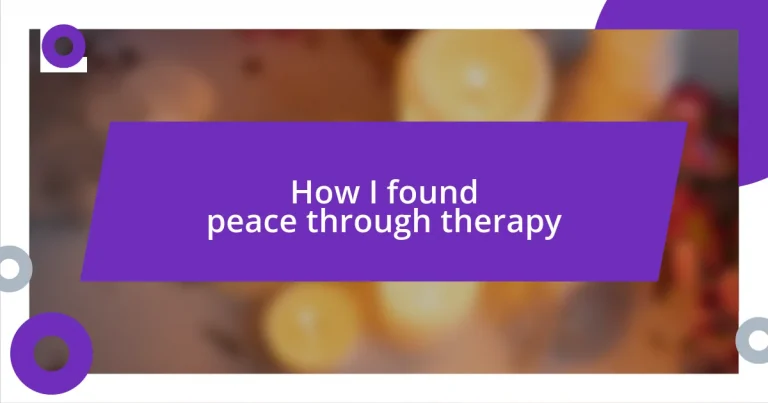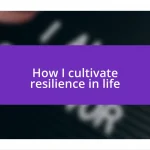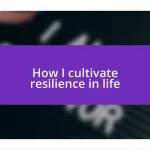Key takeaways:
- The journey to seeking therapy often begins with self-recognition of the need for help and extending the same compassion to oneself that one would offer a friend.
- Finding the right therapist is crucial; compatibility and a shared therapeutic approach can significantly enhance the effectiveness of therapy.
- Maintaining peace after therapy involves establishing routines, surrounding oneself with supportive people, and embracing the non-linear nature of personal growth.
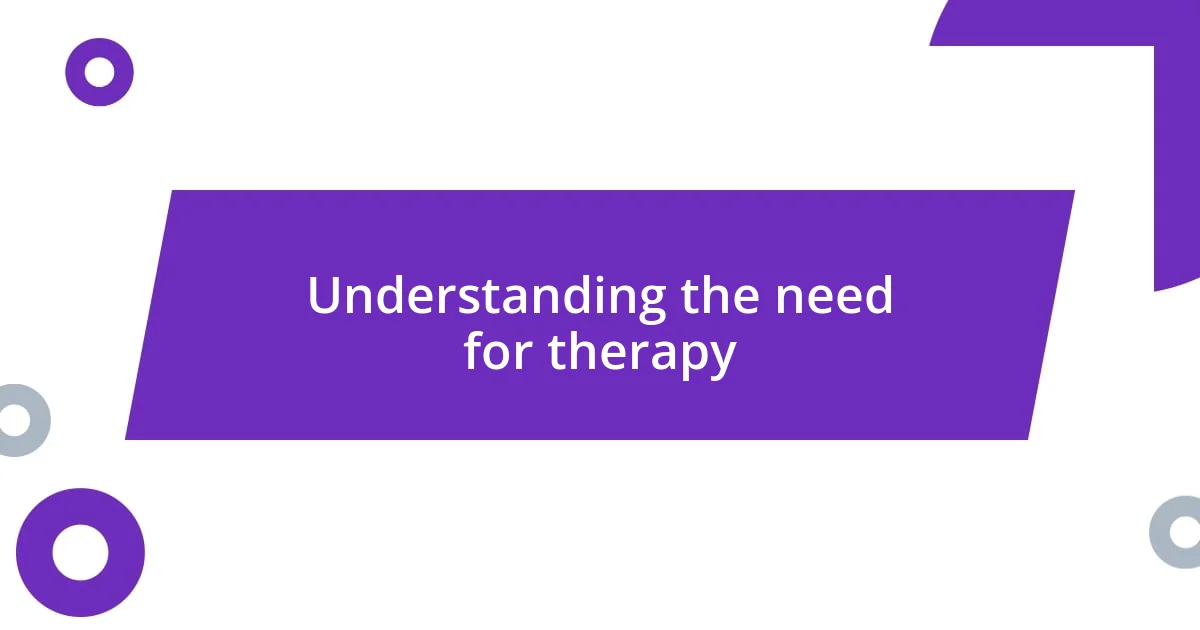
Understanding the need for therapy
Sometimes, it can feel like the weight of the world is on your shoulders. I remember a time when I felt completely overwhelmed—like I was navigating a dense fog without a map. In those moments, I realized that feeling lost often signals a deeper need for help, which is where therapy can open the door to understanding ourselves better.
Have you ever felt stuck in a loop of negative thoughts? I certainly have. It’s in those repetitive cycles that I discovered therapy was not just a resource, but a lifeline. Through the guidance of a therapist, I found that these loops could be disrupted, enabling me to explore the roots of my feelings and reactions in a way that felt safe and structured.
Understanding the need for therapy can also come from recognizing patterns in our behavior that leave us feeling unfulfilled. I once caught myself reflecting on a series of relationships that started off great but fizzled out quickly; I began to wonder why this kept happening. It was that exploration, with the help of a therapist, that led me to identify underlying issues and make meaningful changes in my life, ultimately guiding me to healthier connections.
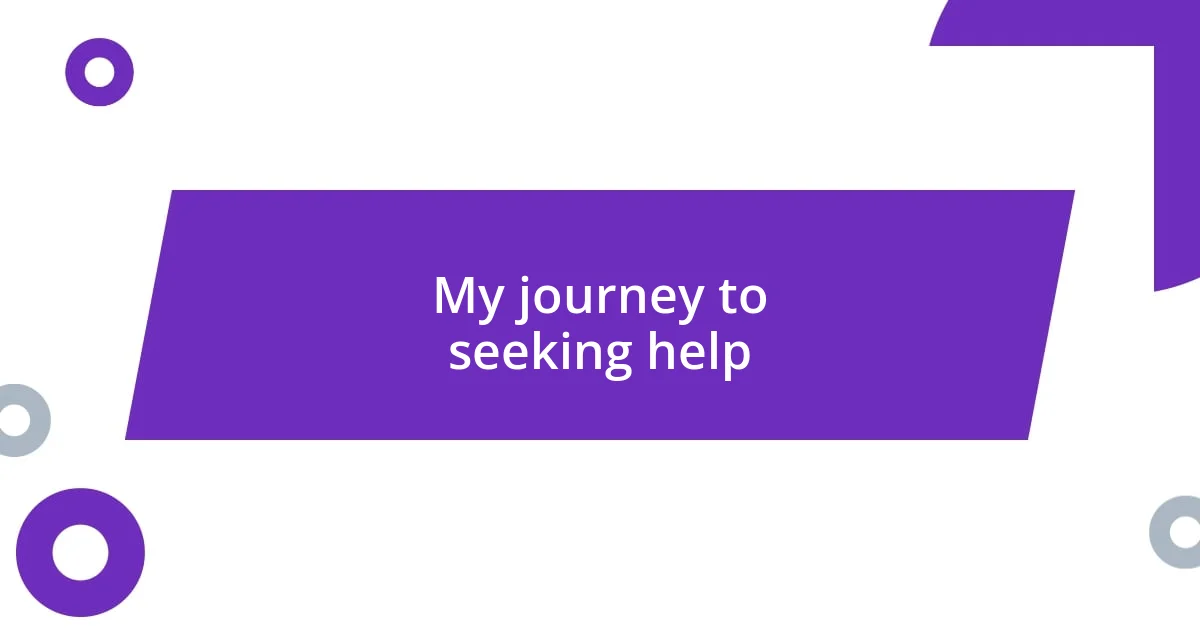
My journey to seeking help
My decision to seek help wasn’t a single moment but a series of small realizations. I remember sitting on the edge of my bed one night, feeling like I was trapped in my own thoughts, replaying the same worries over and over. It struck me that if a friend came to me with the same struggle, I would urge them to talk to someone—why was I not extending that same compassion to myself?
- I recognized the exhaustion of pretending to be okay when inside I felt anything but.
- The sensation of being trapped in my head became unbearable, highlighting my need for support.
- I often reflected on the advice I would give others, realizing it was time to take that advice myself.
Something shifted within me when I finally picked up the phone to call a therapist. I felt a mix of fear and relief; fear of judgment and relief at the idea of beginning to unravel what had been keeping me stuck. The first session felt like stepping into sunlight after a long, dreary winter. I hadn’t realized how much I needed that warmth or how willing I was to explore the deeper narratives of my life.
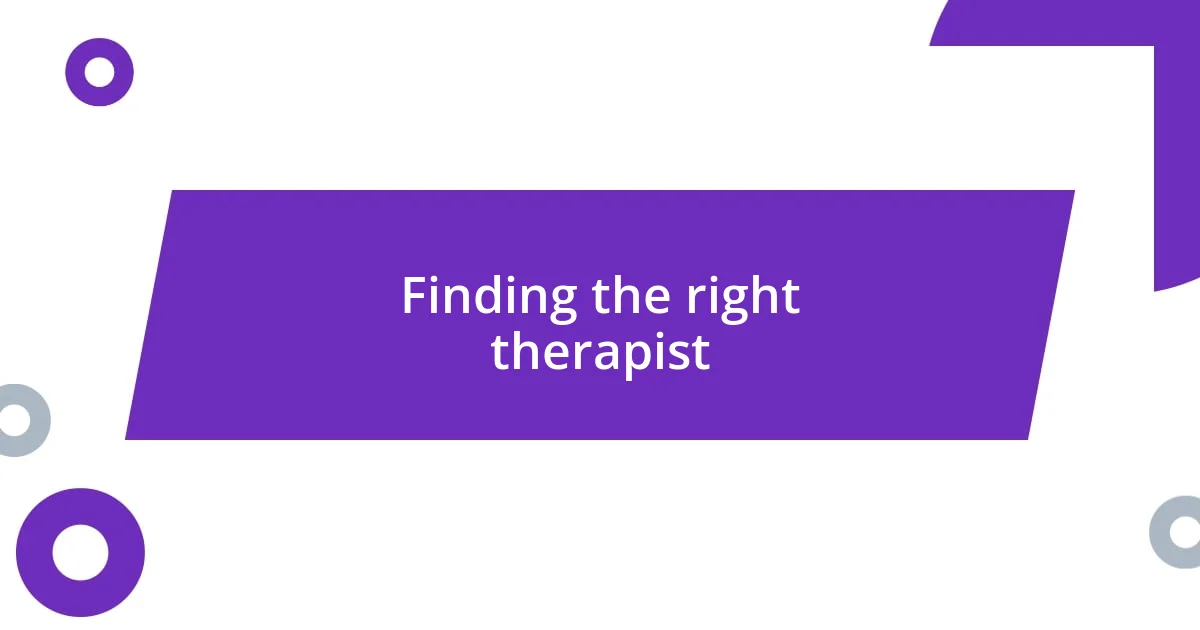
Finding the right therapist
Finding the right therapist can feel like dating—it’s all about chemistry and compatibility. I recall when I had my first session with a therapist who simply didn’t understand my perspective. I left feeling more confused than when I entered. It was clear that the connection was crucial for me to feel safe enough to open up.
As I continued my search, I learned the importance of identifying what I needed in a therapist. For instance, I knew I preferred someone who specialized in cognitive behavioral therapy because I found the structured approach resonated with my need for practical skills. After meeting with a therapist who aligned with this approach, it felt like a light bulb moment; I could finally engage in discussions that weren’t just theoretical but applicable to my life.
In my experience, I’ve also learned that it’s okay to “shop around” for a therapist—the right fit might take a few tries. I once had a consultation with someone who had impressive credentials but didn’t quite get my humor. I realized how essential that aspect was for me; levity in tough conversations often broke the ice and made the sessions feel more comfortable. It’s about finding that balance between professionalism and relatability, which ultimately fostered a space for true healing.
| Factors to Consider | My Experience |
|---|---|
| Specialization | Seeking a therapist who focuses on cognitive behavioral therapy led to practical skills that resonated with me. |
| Personal Connection | Not everyone I met clicked with me; it took a few tries to find someone who understood my perspective. |
| Comfort with Humor | Having a therapist who appreciated my humor made heavy conversations feel lighter and more manageable. |
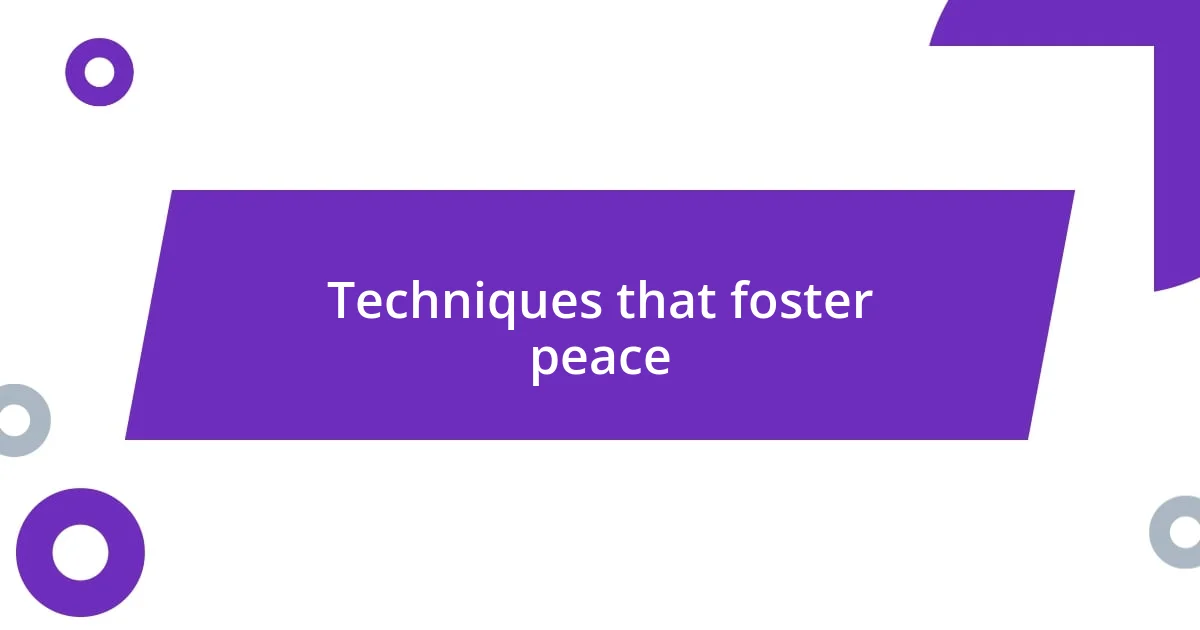
Techniques that foster peace
Therapy introduced me to several techniques that genuinely fostered peace in my life. One standout method was mindfulness meditation. I remember sitting in a warm, cozy room, focusing on my breath—each inhale inviting calmness and each exhale releasing tension. That simple act of being present helped ground me, transforming moments of chaos into opportunities for reflection.
Another valuable technique was journaling. I distinctly recall nights spent pouring my thoughts onto paper, and it was as if a weight was being lifted with every word. It became a safe space where I could express my feelings without fear of judgment. Have you ever felt that relief after articulating your thoughts? For me, writing not only clarified my emotions but allowed me to process experiences that once felt overwhelming.
Finally, I found comfort in visualization exercises. Imagining a serene landscape, like a peaceful beach or a lush forest, transported me away from my troubles. During one of those sessions, I visualized walking along the shore, letting the gentle waves wash over my feet—a moment that reminded me that just as the tide ebbs and flows, so do the challenges in life. It instilled a profound sense of peace, reinforcing that clarity often comes when we take a step back and breathe.
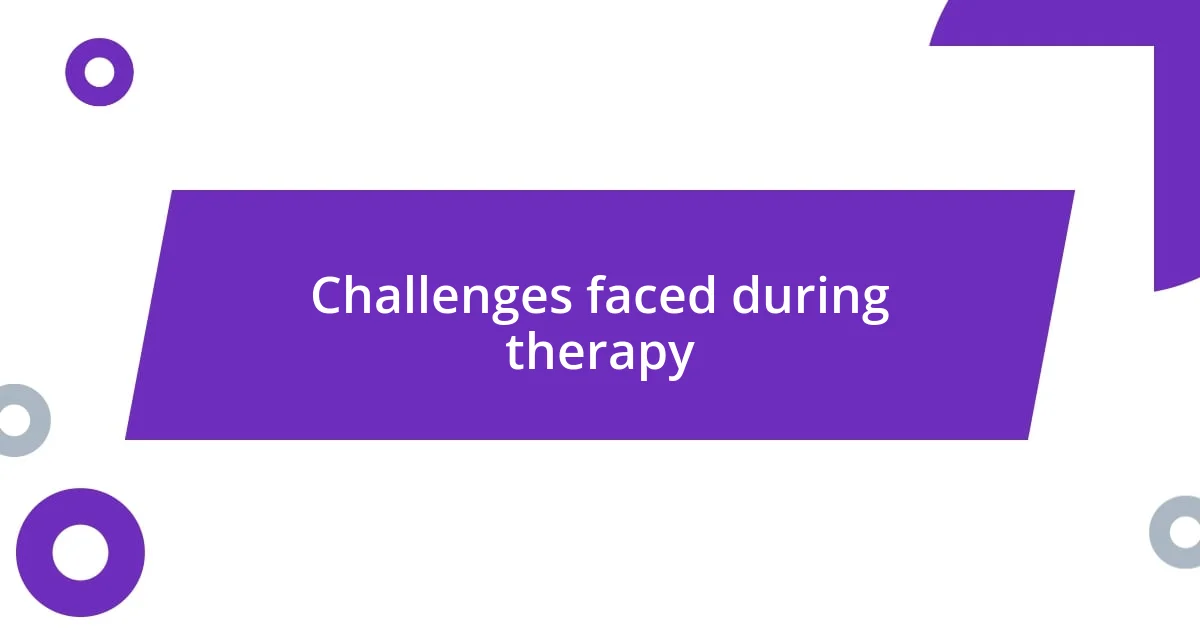
Challenges faced during therapy
There were times during therapy when I felt vulnerable and exposed, almost like standing in front of a large audience in my weakest moments. I vividly remember a session where I had to confront some deeply ingrained fears. The knots in my stomach twisted tighter the more I opened up. It was intimidating, but I quickly learned that facing these feelings head-on was essential for my growth, even if it felt uncomfortable in the moment. Have you ever had to lay bare your inner struggles? It can feel daunting, but there’s a certain empowerment in owning your narrative.
Another challenge I faced was confronting unhelpful patterns in my thinking. I recall a particularly frustrating session where my therapist pointed out that I was often engaging in black-and-white thinking, labeling situations as either completely good or entirely bad. I wanted to argue with her—“No, it’s not that simple!” But over time, I realized she was right. Recognizing these cognitive distortions not only highlighted areas where I needed growth but also opened my eyes to more nuanced perspectives. Has there been a moment in your life where you realized the way you viewed a situation was holding you back?
Lastly, the commitment to consistent attendance was another hurdle. Life gets busy, and I’d sometimes question if I had the energy or time. Yet, I remember one week vividly; I almost canceled an appointment because of a hectic schedule. But something urged me to go, and that session turned out to be one of the most enlightening of my journey. The commitment to my mental health became a profound lesson in prioritizing myself. How often do we put self-care on the back burner? I learned that setting aside time for therapy wasn’t just beneficial; it was necessary for my peace of mind.
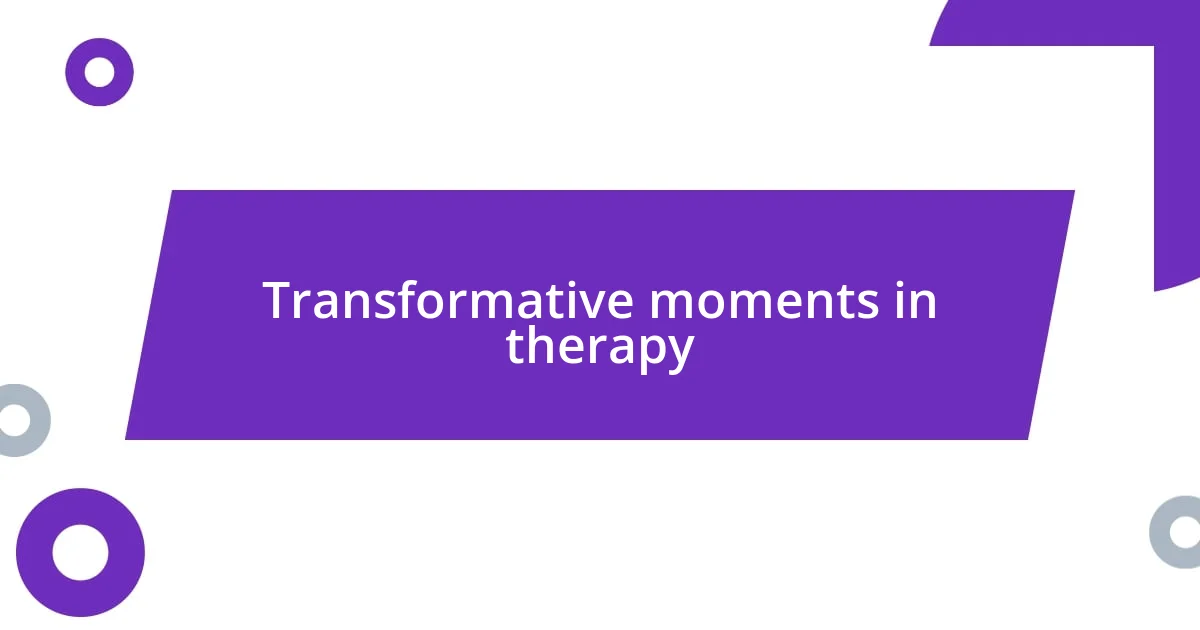
Transformative moments in therapy
Reflecting on my therapy journey, certain moments stand out as pivotal in shaping my understanding of inner peace. One session, I was asked to visualize my feelings as weather patterns—sunshine for joy, storms for anger. As I shared this with my therapist, something shifted within me; I realized I had control over my emotional forecast. Have you ever considered how acknowledging your feelings could transform the way you experience them? That revelation felt like a gentle nudge towards acceptance.
In another session, my therapist guided me through a poignant exercise centered around self-compassion. I remember sitting there, feeling skeptical at first, but as we went deeper into the practice of speaking kindly to myself, I felt a warmth grow in my chest. It was liberating to replace self-criticism with words of encouragement. When was the last time you showed yourself kindness? That shift in dialogue marked a turning point in how I viewed not just my struggles, but also my journey toward healing.
One particularly transformative moment unfolded when I began to embrace vulnerability as strength. I shared a story about a past relationship that had left scars, and with each word, I could feel the heaviness lift. It was as if sharing my truth was releasing a tether that had bound me for too long. Have you ever shared your story and felt an unexpected surge of relief? I discovered that in these moments of honest expression, I connected more deeply with myself and, paradoxically, with others around me. That’s when I truly understood the power of vulnerability in gaining peace.
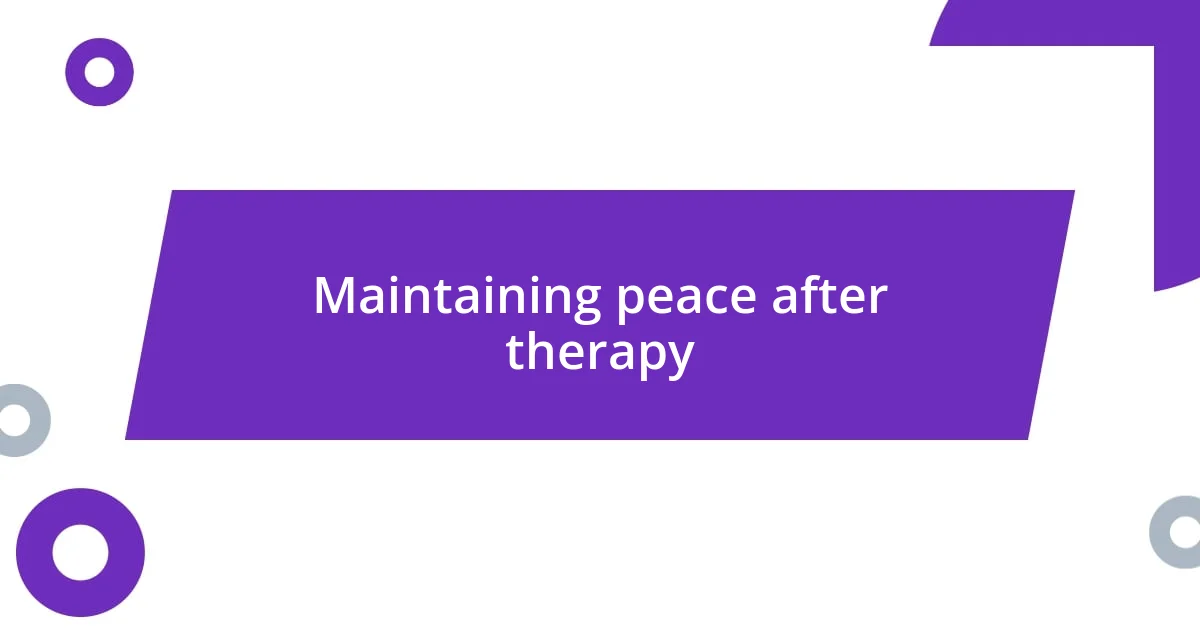
Maintaining peace after therapy
To maintain the peace I’ve gained through therapy, I’ve found that creating routines is essential. Establishing small daily practices, like mindful breathing or journaling, helps ground me. Have you ever noticed how repeating certain actions can foster a sense of calm? For me, even a few minutes spent reflecting each morning sets a positive tone for my day.
Another critical element is surrounding myself with supportive people. After therapy, I realized I had to choose my company wisely. Sharing my experiences with friends who truly understand has been incredibly empowering. Do you have those special people in your life who lift you up? It’s through these conversations that I reaffirm my insights and remind myself of the progress I’ve made.
Finally, I’ve learned to embrace imperfection. The journey toward lasting peace isn’t linear, and self-compassion plays a big role. When I find myself slipping back into anxiety or self-doubt, I remind myself that it’s okay to have off days. Have you ever felt the weight of your own expectations? Accepting that peace is a process has allowed me to navigate life’s ups and downs with more grace.












